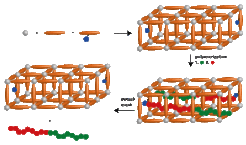Polymerizations in Confined Spaces

Reversible deactivation radical polymerization techniques have attracted significant attention in polymer sciences as well as materials sciences. Thus, molecular weight, polydispersity and endgroups can be controlled easily. Nevertheless, control over monomer sequence and stereochemistry is still not reached. Although several methods exist in that regard, a convenient method has not been described so far. A solution for that issue might lie in porous materials. The research on porous materials has led to variety of accessible compounds with well-defined pore sizes and geometries. Kitagawa and coworkers showed that polymerization reactions can be conducted inside of MOF materials with enhanced stereocontrol. From these encouraging results we are looking for novel systems to increase the control of polymer tacticity. Furthermore, we investigate porous support systems for multi-step polymer synthesis in the direction of monomer sequence control. In the course of our studies, we found out that metal-organic frameworks can be utilized as polymerization catalysts. Thus, monomers are polymerized that are usually inaccessible, the catalyst is recyclable and less catalyst contamination is found in the polymer products. Another area of interest is the morphosynthesis of metal-organic mesocrystals that is based on a combination of metal-organic framework synthesis and double hydrophilic block copolymers. In such a way unprecedented crystal architectures can be generated easily.
